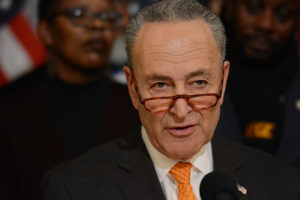
Senate Majority Leader Chuck Schumer (D-N.Y.) on Monday filed a procedural motion to move forward on the chamber's version of the fiscal year 2022 defense authorization bill, with a vote to begin floor debate likely set for Wednesday. In a letter sent out Sunday to lawmakers, Schumer also said a $250 billion Senate-passed bipartisan package aimed at bolstering supply chain and technology competitiveness with China may be added to its version of the National Defense Authorization Act (NDAA). “As you know,…

 By
By 










